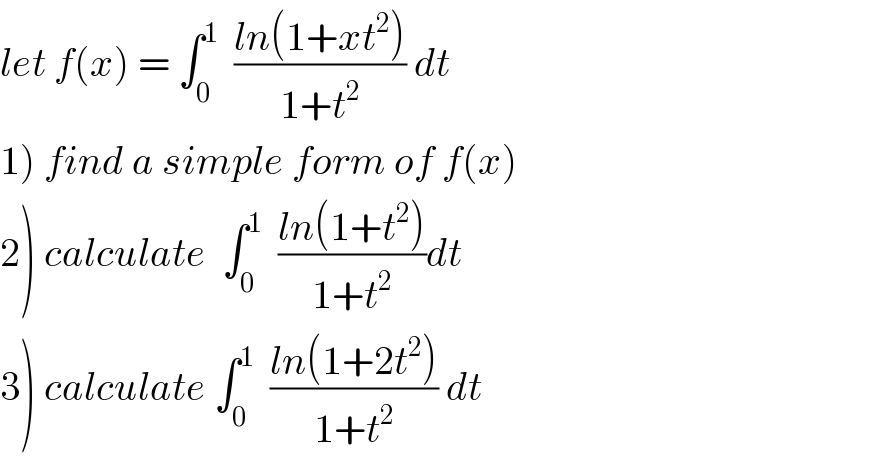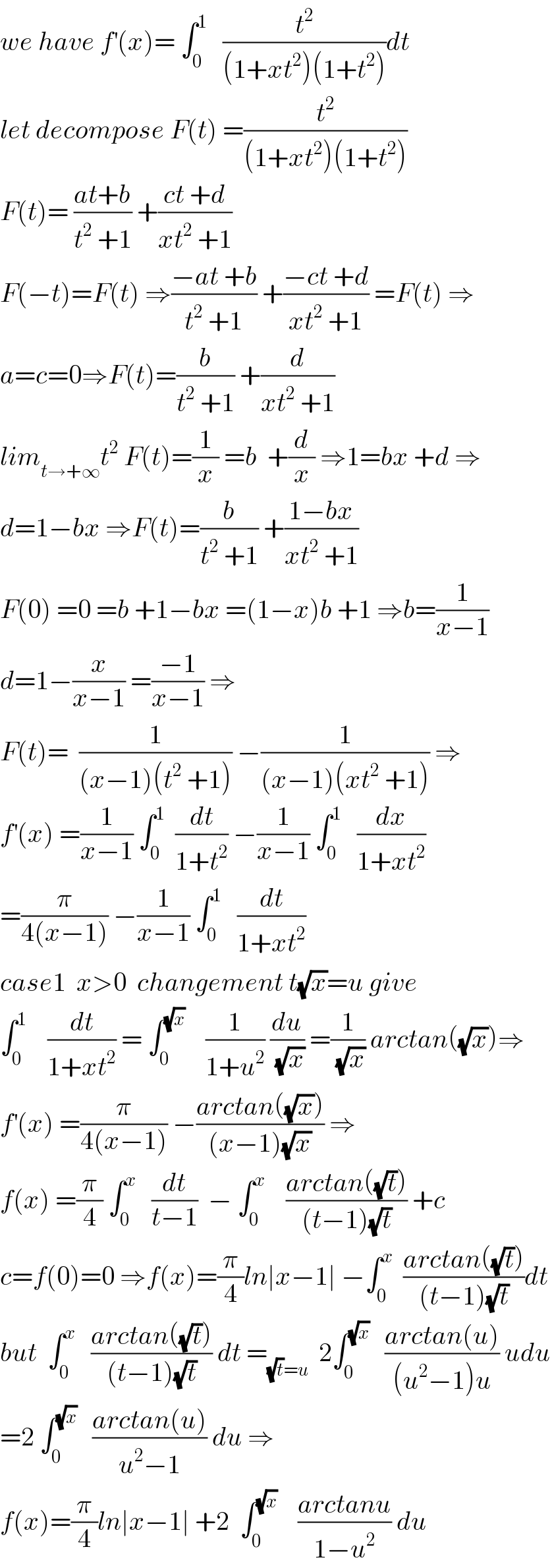Question Number 41762 by math khazana by abdo last updated on 12/Aug/18

Commented by math khazana by abdo last updated on 13/Aug/18

Commented by math khazana by abdo last updated on 13/Aug/18
![case 2 x<0 ∫_0 ^1 (dx/(1+xt^2 )) = ∫_0 ^1 (dt/(1−((√(−x))t)^2 )) =_((√(−x))t =u) ∫_0 ^(√(−x)) (1/(1−u^2 )) (du/( (√(−x)))) =(1/( (√(−x)))) ∫_0 ^(√(−x)) (du/(1−u^2 )) = (1/(2(√(−x)))) ∫_0 ^(√(−x)) ((1/(1−u)) +(1/(1+u)))du =(1/(2(√(−x))))[ln∣((1+u)/(1−u))∣]_0 ^(√(−x)) = (1/(2(√(−x))))ln∣((1+(√(−x)))/(1−(√(−x))))∣ ⇒ f^′ (x) = (π/(4(x−1))) −(1/(2(x−1)(√(−x))))ln∣((1+(√(−x)))/(1−(√(−x))))∣ ⇒ f(x)=(π/4)ln∣x−1∣ −∫ (1/(2(x−1)(√(−x))))ln∣((1+(√(−x)))/(1−(√(−x))))∣dx +c](https://www.tinkutara.com/question/Q41837.png)
Commented by math khazana by abdo last updated on 13/Aug/18
![2) let A = ∫_0 ^1 ((ln(1+t^2 ))/(1+t^2 ))dt A=_(t=tanθ) ∫_0 ^(π/4) ((ln(1+tan^2 θ))/(1+tan^2 θ)) (1+tan^2 θ)dθ = ∫_0 ^(π/4) ln((1/(cos^2 θ)))dθ =−2 ∫_0 ^(π/4) ln(cosθ)dθ let H = ∫_0 ^(π/4) ln(cosθ)dθ and K = ∫_0 ^(π/4) ln(sinθ)dθ we have H =_(θ=(π/2)−t) −∫_(π/2) ^(π/4) ln(sint)dt = ∫_(π/4) ^(π/2) ln(sint)dt = −∫_0 ^(π/4) ln(sint)dt +∫_0 ^(π/2) ln(sint)dt =−K −(π/2)ln(2) ⇒ H +K =−(π/2)ln(2) K−H = ∫_0 ^(π/4) ln(sinθ)dθ −∫_0 ^(π/4) ln(cosθ)dθ =∫_0 ^(π/4) ln(tanθ)dθ =_(tanθ =u) ∫_0 ^1 ((ln(u))/(1+u^2 )) du =∫_0 ^1 (Σ_(n=0) ^∞ (−1)^n u^(2n) )ln(u) du =Σ_(n=0) ^∞ (−1)^n ∫_0 ^1 u^(2n) ln(u)du by parts A_n = ∫_0 ^1 u^(2n) ln(u)du = [(1/(2n+1))u^(2n+1) ln(u)]_0 ^1 −∫_0 ^1 (1/((2n+1))) u^(2n) du =−(1/((2n+1)^2 )) ⇒ K−H = Σ_(n=0) ^∞ (((−1)^(n+1) )/((2n+1)^2 )) = λ_0 ⇒ 2K =−(π/2)ln(2) +λ_0 ⇒K =−(π/4)ln(2) +(λ_0 /2) H =−(π/2)ln(2) −K =−(π/4)ln(2)−(λ_0 /2)](https://www.tinkutara.com/question/Q41839.png)
